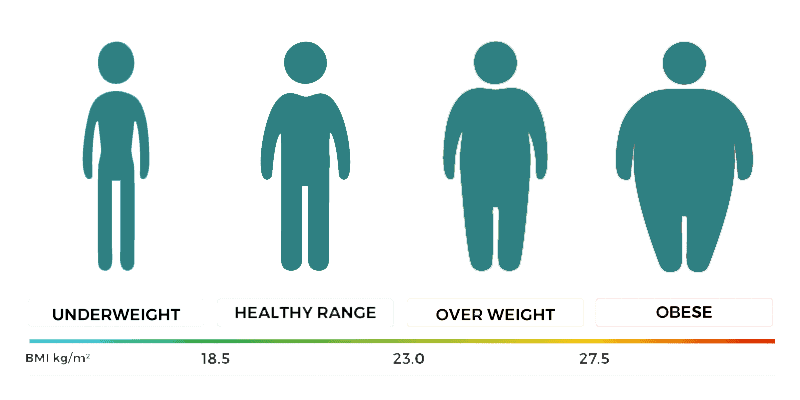Obesity is a chronic disorder that can lead to a plethora of health problems such as diabetes, high blood pressure, depression, infertility and obstructive sleep apnea. Because obesity can affect many organs, it may be difficult to treat. When other medically supervised methods of weight loss have failed, weight-loss surgery is an effective way to lose weight and maintain that weight loss.
The term “morbid obesity” comes from the probability that individuals with this medical condition will die earlier than their healthier peers.
To be considered for weight-loss surgery, you must meet the following qualifications:
A body mass index (BMI) of 40 or higher (20 to 25 is considered normal). BMI is a calculated by dividing your weight in kilograms by height in meters squared. See our BMI calculator.
A body mass index (BMI) between 35 and 40 and have an obesity-related condition such as cardiovascular disease, diabetes mellitus, hypertension or severe sleep apnea.
Bariatric procedures fall into three categories:
• Restrictive procedures, such as the Lap-Band® procedure and the sleeve gastrectomy, physically limit the amount of food a patient can consume by reducing the size of the stomach or the amount it can expand.
• Restrictive with malabsorptive component procedures, including Roux-en-Y gastric bypass, do the same but also surgically reroute the digestive tract so that food actually bypasses most of the stomach. Combined procedures make up 80 to 85 percent of all bariatric surgeries performed in the United States.
• Purely Malabsorptive procedures, such as biliopancreatic diversion bypass, do not affect food intake but instead limit the absorption of calories and nutrients from food by creating a bypass around a significant length of intestine.
For very ill obese patients the procedure may sometimes broken down into two smaller operations.
Some inexperienced surgeons perform bariatric surgery with the traditional “open surgery,” necessitating a large abdominal incision. Dr Niazy Selim perform these procedures laparoscopically, meaning that they are conducted by making small incisions in the abdomen and inserting tiny instruments through those incisions.
During laparoscopic surgery, a telescope attached to a camera project the image of the patient’s organs and the surgical instruments onto a video monitor. Because of the minimally invasive nature of laparoscopic surgery, time in the hospital, postoperative pain, and infection risks are markedly reduced in comparison to open surgery.
To determine which procedure may be appropriate for you, you need to schedule a consult with Dr Niazy Selim to discuss and weigh the risks versus the benefits for each procedure.
Why should I have weight loss surgery?
Obesity affects over two-thirds of American adults. Of those people, 15% are afflicted with the chronic disease of morbid obesity.
Morbid obesity is a much more serious condition than just being overweight. Morbid obesity presents myriad serious health conditions. Stop telling yourself that morbid obesity is simply caused by a lack of willpower — it is a very complex disease with a combination of causative factors such as genetics, environment and individual psychology.
There are many social, economic, emotional and quality-of-life implications of morbid obesity, as well. After weight loss surgery, our patients report improvements in these areas of their lives, as well as significant improvements in their health.
Is surgery the only effective long-term treatment for morbid obesity?
Bariatric surgery is the most effective therapy available for morbid obesity and can result in improvement or complete resolution of obesity co-morbidities. Most individuals seeking weight loss surgery have previously tried to reach and maintain a healthy weight through diet, exercise and medications. Diet and exercise programs alone are not effective for lasting weight loss.
In fact, medical weight loss through just dieting is met with a slowdown in metabolism and an increase in both appetite and desire for food. This makes it almost impossible to maintain weight loss with diet and exercise alone. Bariatric surgery provides a tool for long-term weight loss by introducing other supportive factors like restricting how much food you eat and how you feel after eating the wrong foods.
In 1991, the National Institutes of Health endorsed surgery for the treatment of morbid obesity. Since that time, the American Heart Association, the International Diabetes Foundation and the American Diabetes Association have issued statements affirming the effectiveness of bariatric surgery.
In 2012, the New England Journal of Medicine published two studies attesting to the effectiveness of weight loss surgery options in the treatment of Type 2 diabetes, finding it more effective than treatment with medication.
Dr Niazy Selim has been performing surgical weight-loss procedures since 2003. There are multiple weight-loss procedures offered at SELIM SURGERY CENTER and each is considered “restrictive,” which means the procedure limits the amount of food you can consume at one time.
During your initial visit to the Selim Bariatric Surgery Center, a member of our team will discuss in detail the different operations, explain the risks and benefits of each, and determine the procedure that’s best for you.
When considering weight-loss surgery, it is important to understand that success in maintaining weight loss is dependent on your commitment to making major diet and lifestyle changes. Surgery is a powerful tool meant to assist in weight loss. Your participation at home and through our bariatric program is important in achieving your weight loss goals, and in maintaining weight loss so you can be successful many years after surgery.





